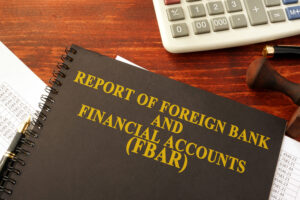FBAR Penalties Could Be Lessened Under New IRS Guidelines
According to the IRS, “if you have a financial interest in or signature authority over a foreign financial account, including a bank account, brokerage account, mutual fund, trust, or other type of foreign financial account, exceeding certain thresholds, the Bank Secrecy Act may require you to report the account yearly to the Department of Treasury by electronically filing a Financial Crimes Enforcement Network (FinCEN) 114, Report of Foreign Bank and Financial Accounts (FBAR).”
In other words, anyone who has money in a foreign bank account that exceeds $10,000 at any time during a given year will need to report that income to the IRS via an FBAR. However, recently, the IRS issued some new guidance regarding the penalties for those who don’t file an FBAR. According to reports, the IRS released a statement that noted: “For each year for which it is determined that there was a willful violation, examiners must fully develop and adequately document in the examination work papers their analysis regarding willfulness.”
For any case that involves willful violation for several years, it is up to the examiner to recommend the penalty length for each year the violation was determined to be willful. The IRS stated that typically the total penalty for the combined years under examination would not exceed ‘50 percent of the highest aggregate balance of all unreported foreign financial accounts during the years under examination.”
Meantime, an examiner can recommend more or less than the 50 percent threshold, but the total penalty cannot “exceed 100 percent of the highest aggregate balance.” There are obviously many possible scenarios and each case will be treated separately on its own merits and circumstances. The bottom line is you should still report your FBARs each year and report them on time. If you need help planning for and filing your FBAR then contact GROCO today at 1-877-CPA-2006, or by clicking here.
You Thought FBAR (Foreign Bank Account Report – Form TD F 90-22.1) Was Bad?
You Thought FBAR (Foreign Bank Account Report – Form TD F 90-22.1) Was Bad? By Ron Cohen, CPA, MST Partner Greenstein, Rogoff, Olsen & Co., LLP PLEASE See: http://www.calcpa.org/Content/26096.aspx We are happy to help you meet these old & new disclosure requirements. Non-reporting subjects a taxpayer to horrendous penalties, even if no tax is due.…
What the IRS Has On File About You and How to Obtain Your Tax Files
What the IRS Has On File About You and How to Obtain Your Tax Files IRS liens and levies can wreak havoc on a person’s life, making it difficult to obtain financing on a home or a car and wiping out savings. Maybe you want access to your tax files to see where the problem…
How to Respond to That FATCA Letter You Just Received in the Mail
How to Respond to That FATCA Letter You Just Received in the Mail Are you among the many Americans who have a bank account(s) in another country? If you are, then you have probably received a letter in the mail recently from the IRS. If you haven’t, then it’s almost assuredly on its way. So…
Job Search Expenses Can be Tax Deductible
Can job search expenses be tax deductible? Summertime is the season that often leads to major life decisions, such as buying a home, moving or a job change. If you are looking for a new job that is in the same line of work, you may be able to deduct some of your job hunting…




